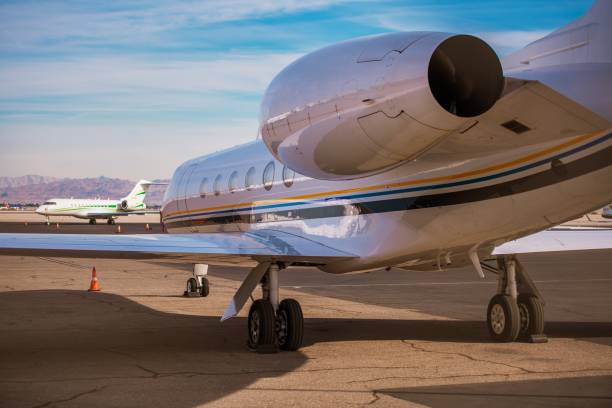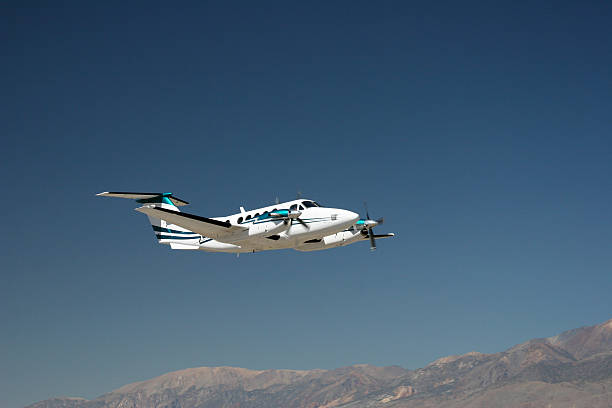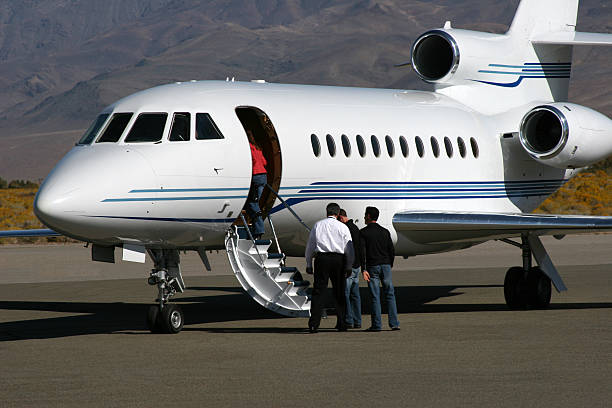Chicago Private Jet Charter: Business, Sports & Leisure Travel Guide

In the heart of America's heartland, Chicago stands as a commanding business hub where time is the ultimate currency. For corporate executives, sports teams, and discerning leisure travelers, private jet charter has transformed from luxury to necessity. Chicago O'Hare is the busiest airport in the Midwest United States and was the world's 7th busiest airport in 2024, having around 80 million travelers. O'Hare processed more than 80 million passengers last year, an 8.3% increase over 2023, making efficient aviation solutions more critical than ever.
The private aviation landscape is experiencing unprecedented growth. Global Private Jets Charter Market, valued at USD 28.01 billion in 2024, will grow to USD 29.38 billion in 2025 and USD 11.9 billion by 2033, at 4.9% CAGR. The private jet industry is experiencing significant growth in 2024, surpassing pre-pandemic levels. This surge reflects a fundamental shift in how business leaders approach travel efficiency and productivity.
The Chicago Advantage: Gateway to Global Commerce
Chicago's strategic location and robust aviation infrastructure make it an ideal hub for private jet operations. Together Chicago's airports generate more than $45 billion in annual economic activity and create 540,000 jobs for the region. The city's dual-airport system provides unparalleled flexibility for private aviation.
O'Hare International Airport (ORD)
As of 2024, O'Hare is considered the most connected airport in the United States, and fifth most connected airport in the world. It is also the world's fourth busiest airport and 16th largest airport. For private jet passengers, The sole FBO operating at O'Hare is Signature Aviation, which provides quality services for private jet passengers, from deicing and hangar space to hot chocolate and muffins.
Chicago Midway International Airport (MDW)
Midway is one of the busiest airports in the nation and the second-busiest airport in both the Chicago metropolitan area and the state of Illinois, serving 22,050,489 passengers in 2023. Midway has two excellent FBOs to service private jet passengers: Signature Aviation and Atlantic Aviation. Both FBOs provide fueling, deicing, and storage options for private jets.
Notably, Chicago Midway International Airport (MDW) ranks among the top 10 airports for business jet travel, demonstrating its importance in the private aviation ecosystem.
Market Dynamics: Understanding Private Aviation Growth
The private jet charter industry is experiencing remarkable expansion driven by multiple factors. Growth is driven by increased wealth, pandemic concerns, business travel needs, and desire for better experiences. Corporate demand has particularly accelerated, with corporate requests for private charters have tripled compared to 2024 across the industry.
Key Market Statistics
On-demand trips generated 52.18% of the private jet charter services market revenue 2024, reflecting reliance on flexible arrangements for last-minute executive travel and special events. This statistic underscores the growing demand for flexible, responsive aviation solutions that traditional commercial airlines cannot provide.
The corporate segment remains dominant, with corporates and SMEs secured 45.71% of demand in 2024. Corporations and SMEs accounted for 45.71% of charter demand in 2024, embracing private aviation to compress multi-city schedules, protect intellectual property, and enhance senior-team productivity.
Business Travel: Maximizing Executive Productivity
For Chicago-based corporations, private jet charter represents a strategic investment in executive efficiency. This combination of convenience, privacy, and time-saving capabilities has made business jets a crucial tool for corporate travel, enabling executives to conduct meetings, negotiate deals, and visit multiple locations in a single day, ultimately enhancing productivity and global connectivity. A private jet becomes a secure mobile office, enabling executives to hold confidential meetings or prepare sensitive presentations without distraction.
The Time Value Proposition
Time is the most valuable commodity for business leaders and affluent travelers. Flying commercial—even in business class—still means long queues, delayed flights, and reliance on hub airports. Private jets rewrite the equation. Travelers arrive just 15–20 minutes before departure, board directly, and fly point-to-point into smaller airports closer to their true destination.
Corporate Travel Trends
Recent analysis reveals significant shifts in corporate aviation preferences. The private jet landscape is evolving, with a clear shift towards larger, long-range aircraft. Subscribers searching for super-midsize solutions increased from 19.1% in 2021 to 23.3% in the most recent survey. Large cabin jet demand also increased from 4.7% to 7.4%
This trend reflects corporate needs for enhanced capabilities and greater range flexibility, particularly for international business operations.
Sports Travel: Championship-Level Service
Chicago's rich sports heritage—from the Bulls and Blackhawks to the Bears and Cubs—creates unique charter opportunities. Professional sports teams increasingly rely on private aviation for competitive advantages, including:
- Schedule Flexibility: Avoiding commercial airline delays that could impact game preparation
- Team Cohesion: Maintaining team unity during travel
- Performance Optimization: Reducing travel fatigue through superior comfort and timing
- Security: Ensuring player safety and privacy
The sports entertainment segment shows robust growth potential, with sports and entertainment use is set to grow at a 9.24% CAGR to 2030.
Leisure Travel: Elevated Experiences
Chicago's affluent residents increasingly choose private aviation for leisure travel, driven by desires for enhanced experiences and time optimization. High-net-worth Individuals and Families: These travelers seek privacy, convenience, and luxury. 81% of affluent 18-35-year-olds surveyed in 2025 work remotely, making flexible air travel a must. This same group is entering private aviation much younger in life than previous generations, seeking things such as flexibility, wellness features, and connectivity.
Changing Demographics
The private aviation market is witnessing generational shifts. They want jets that can function as airborne offices. Whereas older generations focus more on professional attire for private jet travel, younger wellness-focused generations are ignoring tradition in favor of more comfortable attire, up to and including athleisure.
This demographic evolution is reshaping service expectations and aircraft configurations across the industry.
ParaFlight's Competitive Advantage: Speed and Expertise
Speed: The Ultimate Differentiator
In today's fast-paced business environment, ParaFlight's ability to secure last-minute and same-day charters provides clients with unparalleled responsiveness. On-demand trips generated 52.18% of the private jet charter services market revenue 2024, reflecting reliance on flexible arrangements for last-minute executive travel and special events. This market demand aligns perfectly with ParaFlight's core competency.
Expert-Driven Concierge Model
ParaFlight's concierge approach ensures every detail receives professional attention. Our expert-driven model encompasses:
- Aircraft Selection: Matching the optimal aircraft to specific mission requirements
- Route Optimization: Leveraging Chicago's dual-airport system for maximum efficiency
- Ground Services: Coordinating FBO services, catering, and ground transportation
- Regulatory Compliance: Ensuring all operations meet stringent safety standards
Safety Standards: FAA Part 135 Excellence
Safety remains paramount in private aviation. ParaFlight partners exclusively with FAA-certified operators, ensuring all flights operate under the stringent requirements of Part 135 regulations.
Understanding Part 135 Certification
At its core, FAA Part 135 is a certificate required by the Federal Aviation Administration for a company to operate as a non-scheduled air charter carrier. It's designed to set boundaries and establish safety procedures for jet charters and other types of commercial aviation operations that fly on demand. Part 135's requirements are for operators, pilots, and the specific aircraft used during operation. With Part 135 certification, operators are required to follow rules and regulations to operate the aircraft legally.
Enhanced Safety Requirements
Part 135 requires strict pilot duty time limitations, drug, and alcohol testing, pilot background checks, and a wide variety of safety requirements for operating and maintaining the aircraft. These requirements far exceed private aviation standards, providing clients with commercial-airline-level safety protocols.
There are over 2,000 Part 135 Charter Operators in the U.S., but ParaFlight maintains rigorous vetting standards to ensure partnerships only with the most qualified operators.
Aircraft Categories: Matching Mission to Machine
Light Jets: Regional Efficiency
Perfect for Chicago-to-regional destinations, light jets typically accommodate 4-8 passengers with ranges ideal for Midwest business travel. The private jet charter services market size for light-jets, however, is projected to grow at a 7.99% CAGR between 2025 and 2030 as cost-efficient airframes like the Phenom 300 and Citation CJ3 Gen2 open private aviation to regional executives
Midsize Jets: Versatile Performance
Offering the optimal balance of range, capacity, and cost, midsize jets serve the majority of corporate missions from Chicago to major business centers across North America.
Large Jets: Transcontinental Capability
Large jets contributed 53.21% of the private jet charter services market revenue in 2024, favored for intercontinental range and spacious cabins that match corporate protocols. Fleet data confirms that heavy-cabin models capture roughly two-thirds of capital expenditure in new deliveries, as owners seek speed, comfort, and nonstop reach from New York to Tokyo.
For Chicago-based international corporations, large jets provide nonstop capability to global destinations while maintaining executive productivity throughout the journey.
Sustainability Initiatives: Environmental Responsibility
The private aviation industry increasingly prioritizes environmental stewardship. With growing environmental concerns, there's a push for using sustainable fuels to cut carbon emissions and make private flights greener. On the aircraft development front, sustainability continues to be a global focus for the private jet industry.
Sustainable Aviation Fuels (SAF)
Leading operators are incorporating SAF into their fuel programs, reducing carbon footprints without compromising performance or safety standards.
Fleet Modernization
Fleet modernization programs underscore a shift toward performance and sustainability. Honeywell forecasts 8,500 new business jet deliveries worth USD 280 billion by 2035, with North America absorbing 66% of shipments.
Operational Considerations: Chicago-Specific Advantages
Weather Resilience
Chicago's continental climate presents seasonal challenges, but experienced operators leverage advanced weather systems and flexible routing to maintain schedule reliability.
Airport Access
Domestic operations held 48.22% of the private jet charter services market share in 2024 as executives leveraged secondary airports to bypass congested hubs. Cross-country trips between New York and Silicon Valley remain a mainstay in the US, while short-haul hops under two hours dominate European itineraries.
Chicago's extensive airport network provides multiple options for weather diversions and schedule optimization.
Cost Considerations: Value-Based Decision Making
Private jet charter pricing varies based on aircraft type, route, and timing. Charter Prices: $$4K-$$5K/hour for turboprops; $$15.2K-$$18.5K/hour for heavy jets. However, the total cost of ownership calculation must include time savings, productivity gains, and opportunity costs of commercial aviation delays.
Market Pricing Trends
Straits Research predicts that the private jet market will rise from a total value of $17.01 billion in 2024 to $21.25 billion in 2033. That represents a compound annual growth rate (CAGR) of 2.5% across the multiyear period.
Regulatory Environment: Compliance Excellence
FAA Oversight
The Federal Aviation Administration (FAA) grants the authority to operate on-demand, unscheduled air service in the form of Part 135 certificate. Air carriers authorized to operate with a 135 certificate vary from small single aircraft operators to large operators that often provide a network to move cargo to larger Part 121 air carriers.
Security Requirements
Applicants who intend on conducting operations under 14 AC Part 135 may be required to adopt and implement a Transportation Security Administration (TSA)-approved security program. The size and scope of the security program required will be based on several factors including, but not limited to, kind of operations conducted, maximum certificated take-off weight of the aircraft, aircraft seating capacity
Future Outlook: Chicago's Aviation Evolution
The Chicago private jet market continues expanding, driven by robust business activity and infrastructure improvements. The private jet industry is soaring into 2025 with strong momentum, driven by increased global flight activity, rising demand for ultra-long-range aircraft, and a younger generation of high-net-worth travelers entering the market. Backed by the latest private jet industry statistics and pilot industry insights, this guide highlights what's ahead for charter clients, aircraft owners, and pilots alike. Despite uncertainty centered around global trade, economic stability, and changes to travel requirements to and from certain countries, the private aviation industry is experiencing resilience and growth, not to mention a wave of innovation.
Growth Projections
Looking ahead, the market is expected to continue its ascent, with forecasts of $30.14 billion in 2024 and $31.71 billion in 2025. Reflecting a consistent rise in the industry's value.
Conclusion: Choosing Excellence in Private Aviation
Chicago's position as America's business crossroads creates unique opportunities for private jet charter. Whether for critical business negotiations, championship sports travel, or exclusive leisure experiences, the right aviation partner makes the difference between good and exceptional.
ParaFlight's expert-driven concierge model, emphasis on speed and responsiveness, and exclusive partnerships with FAA-certified Part 135 operators ensure every flight meets the highest standards of safety, service, and efficiency. In a market where time equals opportunity, ParaFlight delivers the competitive advantage discerning travelers demand.
For Chicago-based executives, sports teams, and affluent individuals seeking the ultimate in aviation excellence, the choice is clear: ParaFlight transforms travel from necessity to strategic advantage.
References
- Business Research Insights - Private Jets Charter Market
- Mordor Intelligence - Private Jet Charter Services Market
- Federal Aviation Administration - Part 135 Certification Requirements
- Chicago Department of Aviation
- Market.us - Business Jets Statistics
All statistical claims in this article are supported by credible sources as cited throughout the text. Market projections represent industry estimates based on current trends and should be considered alongside other market factors when making business decisions.














